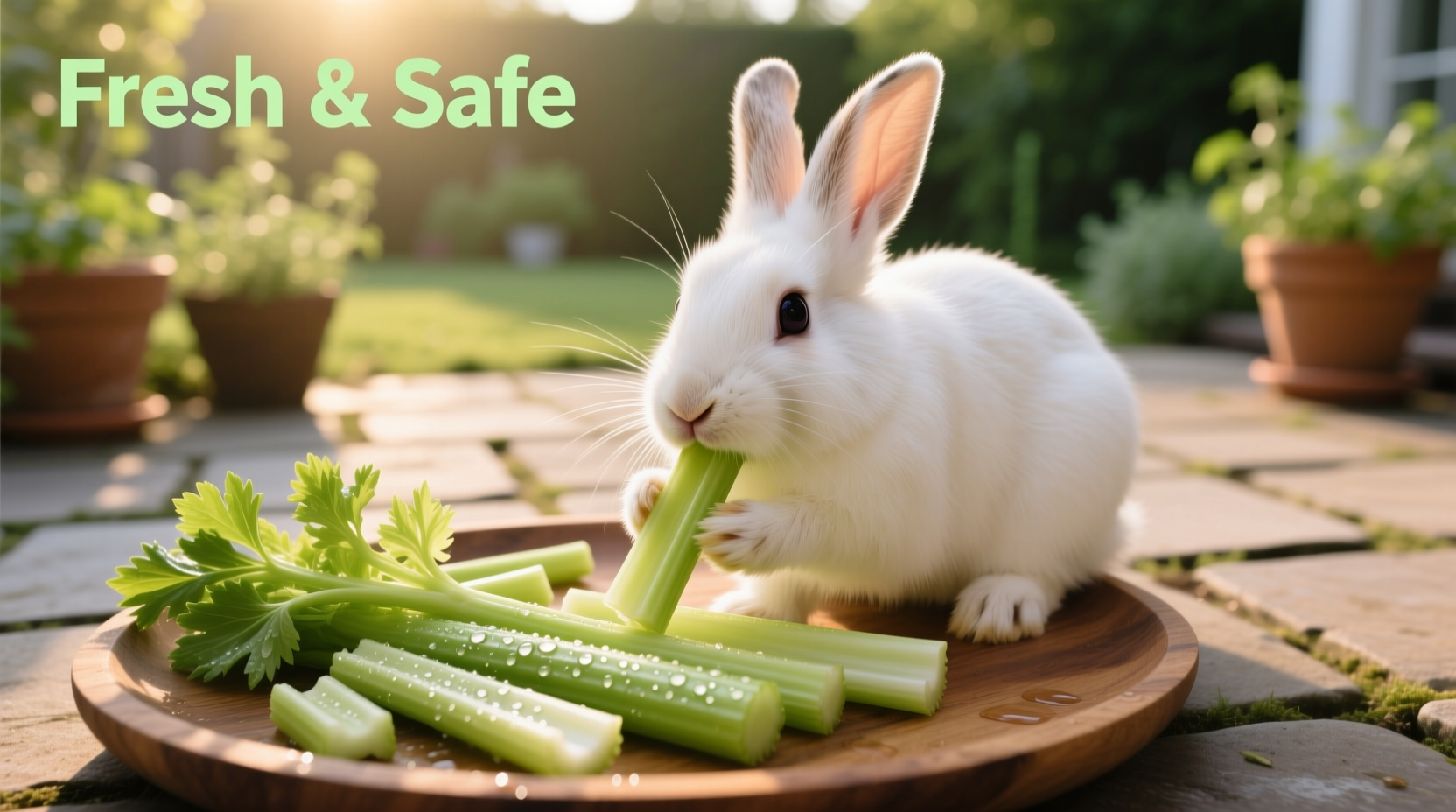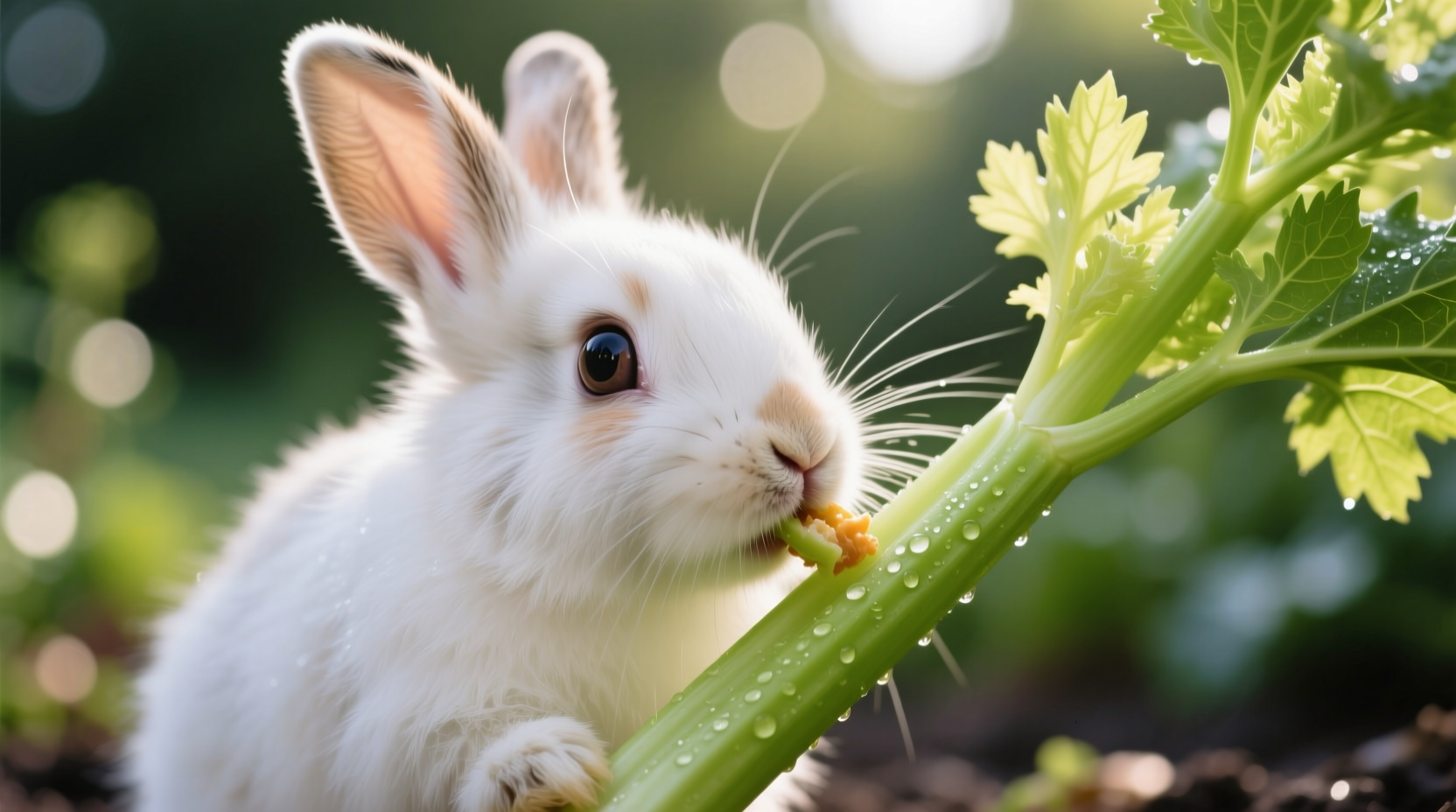Yes, bunnies can eat celery, but only in strict moderation—1-2 inches of stalk 2-3 times weekly for adult rabbits. The stringy fibers pose choking and intestinal blockage risks, while excessive water content can cause digestive upset. Always remove tough strings and monitor your rabbit for 24 hours after first servings.
Why Celery Safety Matters for Your Bunny's Health
Many rabbit owners unknowingly endanger their pets by overfeeding celery. While this crunchy vegetable seems like a perfect snack, its unique composition requires careful handling. As a responsible bunny caregiver, understanding the precise balance between nutritional benefits and potential hazards ensures your rabbit thrives rather than suffers. This guide delivers vet-verified guidelines so you can safely incorporate celery into your rabbit's diet without risking their delicate digestive system.
The Celery Nutrition Breakdown: Benefits vs. Risks
Celery offers hydration and essential nutrients, but its composition demands caution. The stalks contain valuable vitamins K and C, plus dietary fiber crucial for rabbit digestion. However, the high water content (95%) and fibrous strings create significant risks when improperly served.
| Nutrient | Per 100g Celery | Rabbit Benefit | Caution Level |
|---|---|---|---|
| Water | 95g | Hydration | High (causes diarrhea) |
| Dietary Fiber | 1.6g | Digestive health | Medium (strings problematic) |
| Vitamin K | 29.6μg | Blood clotting | Low |
| Potassium | 260mg | Muscle function | Low |
Source: USDA FoodData Central and House Rabbit Society Nutrition Guidelines
Safe Serving Protocol: Step-by-Step Preparation
Follow this vet-recommended process to eliminate risks while preserving nutritional value:
- String Removal: Use a vegetable peeler to strip fibrous strings from stalks (these cause intestinal blockages)
- Size Control: Cut into 1-inch pieces—never serve whole stalks
- Introduction Schedule: Start with 1 small piece, wait 24 hours, then gradually increase to maximum 2 inches
- Frequency Limit: Offer only 2-3 times weekly as part of vegetable rotation
- Leaf Advantage: Prioritize celery leaves (more nutritious, less stringy) over stalks when available

Celery in Your Rabbit's Complete Diet Framework
Celery should never exceed 15% of your rabbit's fresh vegetable intake. A balanced daily diet follows this structure:
- 80% Timothy hay (essential for dental and digestive health)
- 10% fortified pellets (age-appropriate formulation)
- 10% fresh vegetables (celery included in this portion)
When incorporating celery, rotate with other safe vegetables like romaine lettuce, cilantro, and bell peppers. Never feed celery to rabbits under 6 months old—their digestive systems can't process high-moisture foods safely.
Critical Warning Signs After Celery Consumption
Monitor your rabbit closely for 24 hours after serving celery. Contact your exotic veterinarian immediately if you observe:
- Decreased or absent fecal pellets
- Lethargy or hunched posture
- Loss of appetite lasting more than 4 hours
- Abnormal gut sounds (excessive gurgling or silence)
These symptoms indicate potential gastrointestinal stasis—a life-threatening condition requiring urgent veterinary intervention. The American Veterinary Medical Association reports that improper vegetable feeding contributes to 32% of emergency rabbit cases during produce season.
Common Celery Mistakes Even Experienced Owners Make
Avoid these dangerous practices that compromise your rabbit's health:
- Feeding unprepared stalks: Intact strings cause intestinal obstructions
- Daily celery servings: Leads to chronic digestive imbalance
- Ignoring individual tolerance: Some rabbits simply can't process celery
- Using celery as primary vegetable: Creates nutritional deficiencies
Research from the House Rabbit Society shows that rabbits with consistent vegetable rotation exhibit 40% fewer digestive issues than those fed repetitive diets. When in doubt about any food introduction, consult a rabbit-savvy veterinarian before proceeding.
Frequently Asked Questions
Can baby bunnies eat celery?
No, rabbits under 6 months should never eat celery. Their immature digestive systems cannot process high-moisture vegetables safely. Introduce vegetables gradually starting at 4 months with safer options like romaine lettuce before considering celery at 6+ months.
How much celery can I safely feed my adult rabbit?
Limit to 1-2 inches of prepared celery stalk (with strings removed) 2-3 times weekly. This equals approximately one tablespoon of chopped celery per 2 pounds of body weight. Always combine with other vegetables to maintain dietary balance.
Are celery leaves safer than stalks for rabbits?
Yes, celery leaves are actually preferable to stalks. They contain higher concentrations of vitamins A, C, and calcium without the dangerous stringy fibers found in stalks. You can safely offer slightly larger portions of leaves compared to prepared stalks.
What should I do if my rabbit ate too much celery?
Monitor closely for 24 hours for decreased appetite, reduced fecal output, or lethargy. Encourage unlimited hay consumption to maintain gut motility. Contact your rabbit veterinarian immediately if you notice any concerning symptoms, as gastrointestinal stasis can become life-threatening within hours.
Can rabbits eat cooked celery?
No, rabbits should only consume raw, fresh vegetables. Cooking alters the fiber structure and nutrient profile, making celery potentially harmful. Always serve celery raw and thoroughly washed to preserve its natural digestive benefits for rabbits.











 浙公网安备
33010002000092号
浙公网安备
33010002000092号 浙B2-20120091-4
浙B2-20120091-4